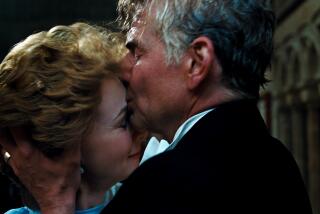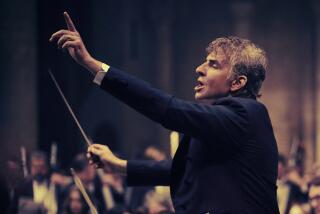Leonard Stein, 87; Schoenberg Institute Chief, Pianist, Teacher
Leonard Stein, who as a pianist and authority on the works of Arnold Schoenberg became one of the preeminent figures in Los Angeles’ musical life, has died. He was 87.
Stein, director of the Schoenberg Institute at USC from its inception in 1975 to 1991, died Wednesday of natural causes at Providence St. Joseph Medical Center in Burbank.
With a passion for the newest of new music that he maintained throughout his life, Stein was a close friend of many of the great 20th century composers, such as Schoenberg, Igor Stravinsky and Pierre Boulez. But he also remained a champion of any number of young local composers and performers.
Until the last month or two of his life, when he began to show signs of frailty, he was regularly seen (and heard) at concerts of contemporary music, candidly expressing his opinions, open to almost anything new but suffering no fools. He continued to schedule concerts as well, and they nearly always included a premiere.
Stein was a no-nonsense pianist. He was -- adamantly -- not a demonstrative player. He valued clarity above all, and he had the rare ability to make immediate sonic sense of structurally complex music, especially that written in the 12-tone system.
But he hardly limited himself to the piano or to Schoenberg, with whom he first studied in 1935. As a teacher who, at one time or another, was associated with most of the major universities and colleges in the Southland, Stein influenced a broad range of students, including avant-gardist La Monte Young -- one of the originators of Minimalism -- and Van Cliburn Competition-winning pianist Jan Nakamatsu.
Stein also influenced musical life in Los Angeles as a concert presenter.
In 1960, he organized the Encounters series in Pasadena, making Southern California a focal point for the most advanced music from Europe, Asia and America.
Boulez, Olivier Messiaen, Karlheinz Stockhausen and John Cage were among the composers who participated.
In 1994, three years after he retired from teaching, Stein organized Piano Spheres, a series of piano recitals that offers some of the liveliest programming in town. He also continued to play one recital a year in the series, although he canceled this year’s because of illness.
“He was a wonderful man, a wonderful pianist and a wonderful influence,” said Leon Botstein, president of Bard College in upstate New York and music director of the American Symphony Orchestra and the Jerusalem Symphony.
“We associate strong judgmental commitments with intolerance,” Botstein added. “But here was a person who had a profoundly rooted perspective on how music should be understood and written, and combined it with an enormously gracious and open-minded perspective.”
Lawrence Schoenberg, the youngest of the composer’s children, also remembered Stein’s strong opinions.
“He was very dedicated and always defending my father,” said Schoenberg, who fondly recalled being taken, as a child, to baseball games by Stein. “He was always the first to write a letter to the editor of the Los Angeles Times after a nasty review. As a teacher, he was the most important advocate of my father.”
Stein was a lifelong Angeleno. Born in 1916, he attended Los Angeles City College and studied with Richard Buhlig, a colorful local pianist with close ties to composer and pianist Ferruccio Busoni in Berlin. When Schoenberg fled the Nazis and settled in Los Angeles in 1934, Stein immediately enrolled in his classes at USC and UCLA.
Stein said he always felt privileged to have learned about music in Los Angeles.
“I got a good education just by listening to fine music,” he told The Times in 2001, “because of the refugees and people like Buhlig.... I didn’t plan on a career as a pianist by going to the Eastern schools ... which back then anyone who wanted to have a career had to do. I just stuck around.”
While earning a master’s degree at UCLA -- where he had also received his bachelor’s -- Stein served there as Schoenberg’s teaching assistant from 1939 to 1942.
From 1941 until the composer died 10 years later, Stein was his personal assistant, working closely with Schoenberg on the editing of his scores. Through the composer, Stein also gained entree into the local emigre community, where he got to know many writers, painters and musicians who had fled Germany and Austria.
Only after Schoenberg’s death did Stein begin to play the composer’s piano music widely. During the ‘50s, he was a frequent performer at the Monday Evening Concerts, which are now part of the music program at the Los Angeles County Museum of Art.
It was also during this period that Stein began a long teaching association with Southern California institutions of higher education, including Occidental College, Los Angeles City College, Pomona College, UCLA, UC San Diego, Cal State Dominguez Hills, California Institute of the Arts and what is now Claremont Graduate University.
Stein’s most important academic appointment, however, was to the directorship of the Arnold Schoenberg Institute at USC in 1975. Housed in a specially designed Bauhaus building on campus, the facility was the repository of Schoenberg’s archives. But, ever the practical musician and promoter of living composers, Stein began a groundbreaking concert series in the institute’s intimate concert hall, where he often featured such emerging artists as the Kronos Quartet playing cutting-edge music.
Stein’s retirement in 1991 proved a fatal blow to the institute. USC, which had long had its eye on the building, eventually withdrew its support, and in 1998 the archive was transferred to Vienna.
Retirement meant little to Stein, who still played, taught and ran Piano Spheres. He also continued to write about Schoenberg and edit Schoenberg materials. Among the most important books he edited were several volumes of Schoenberg’s teaching manuals and “Style and Idea,” a collection of the composer’s writings.
Mark Robson, one of the pianists involved with Piano Spheres, once compared Stein to the wizard of Oz.
“It’s a funny metaphor,” Robson told The Times three years ago, “but [he’s] someone who tells you to go out and get the broomstick from the witch. He is someone who encourages people to flesh out things that they come up with themselves.”
Stein is survived by a niece, Betty Coleman, and a nephew, Phil Stein, both of Los Angeles. His wife, Marie D. Stein, died in 1986. Plans for a memorial are pending.
*
Times staff writer Chris Pasles contributed to this report.
More to Read
The biggest entertainment stories
Get our big stories about Hollywood, film, television, music, arts, culture and more right in your inbox as soon as they publish.
You may occasionally receive promotional content from the Los Angeles Times.











